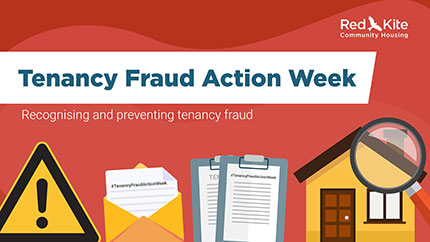This week, from 17th to 23rd November 2025, we’re back with Tenancy Fraud Action Week for a second year – a campaign dedicated to raising awareness of tenancy fraud within social housing. This year, we’re partnering with Buckinghamshire Council to amplify the message and ensure homes go to those who truly need them.
Each day, we'll be focusing on a different type of tenancy fraud, explaining what it is and the impact it has on our communities.
Throughout the month of November, we’re also running a key amnesty, giving tenants who are committing tenancy fraud the chance to come forward and hand their keys in with no repercussions. Our aim is to ensure that our homes go to those who genuinely need them.
So, what is tenancy fraud?
Tenancy fraud is when someone lies or cheats to get or keep a home they’re not entitled to.
Types of tenancy fraud include:
- Subletting – this happens when a tenant rents out part or all of their home, even to a family member, without permission. This is a crime that can lead to prison or a fine under the Prevention of Social Housing Fraud Act 2013 and the Fraud Act 2006. It can happen anywhere, including through platforms like Airbnb. Social landlords can ask courts to make tenants repay any illegal profits, often amounting to tens of thousands of pounds
- Misrepresentation – this is when someone lies or leaves out facts to get a home, or a transfer into a bigger one, and can lead to a fine. This is true even if someone else lies for them without being asked
- Joint Tenancy Fraud – Picture this: A tenant tells their landlord that their partner has moved in and asks to add them to the tenancy. However, the new tenant fails to give up or declare another property where they live as their main home. This is a form of tenancy fraud and is treated very seriously, as it deprives people in genuine need of housing.
- Key Selling - If a social tenant is granted a tenancy but never moves in and instead sells the keys to a third party, then this constitutes a criminal offence and is tenancy fraud
- Succession Fraud – Unfortunately, this is a growing phenomenon in the social housing sector. Put simply, it’s when a tenant dies, and a person claims the right to succeed to the tenancy and the home, by saying they’ve lived there for the required amount of time, when in fact, they haven’t.
What are the facts?
In 2012, nearly 100,000 social homes in England were affected by tenancy fraud. Recent research indicates that this number has now increased to at least 148,000
These misused properties could have provided homes for over 104,000 homeless families currently in temporary accommodation in England. The savings could then be used to help the more than 1.2 million people on housing waiting lists.
If you, or someone you know, have been committing tenancy fraud, this is your chance to come forward. Come down to our office during November to hand back your keys with no questions asked.
Our opening hours:
Monday - Thursday: 8.45am - 5.15pm
Friday: 8.45am - 1pm.

